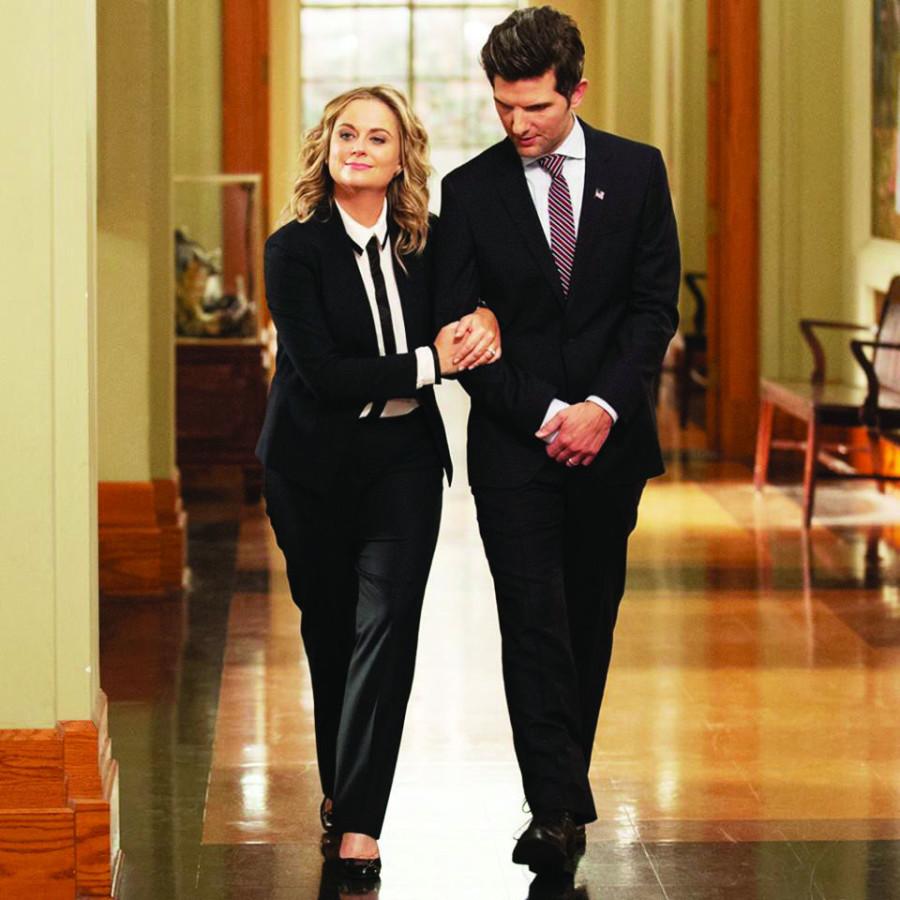Bye bye, Li’l Sebastian: A farewell to ‘Parks and Rec’
February 23, 2015
“Parks and Recreation” seemed like an idea doomed from the start.
From its first trailers and TV spots in 2008, the show, created by Greg Daniels and Michael Schur, appeared to copy the style and feel of the popular fellow NBC sitcom “The Office,” trying to find comedy in a single-camera mockumentary format.
Instead, after finding its footing, the show decided to forgo “That’s what she said” jokes and “Jim Halpert face” and, instead, create its own world of Pawnee, Ind., populating the fictional city with hundreds of strange, quirky and lovable misfits.
The show’s main focus is local government, and it uses the Pawnee Parks and Recreation Department as a lens to discuss broader national issues. It’s tackled gay rights — Leslie Knope (Amy Poehler) accidentally married two male penguins in a ceremony at the zoo, causing a conservative uproar — healthcare issues (Pawnee has a notable obesity problem) and government bipartisanship.
What’s been most refreshing throughout the show’s seven-season run–which is coming to a close tonight on NBC– has been how it has handled this emphasis on politics. In a world where shows like “House of Cards” and, to an extent, “Game of Thrones” paint politicians as bloodthirsty and callous, “Parks” provides a startling alternative — a group of politicians who actually want to do good for their community.
This all starts with Knope, the deputy director of the Parks Department. She boasts a busy-bee work ethic and unbridled optimism for the good her branch of government can accomplish, avoiding the classic traps of a traditional do-gooder. Poehler squeezes comedy out of her earnest good intentions, and the writers have acutely developed her character so that every step of her narrative never seems false — the writers stay completely true to who Knope is.
The importance of her gang of goofballs at the department cannot be understated. The most notable of the supporting cast is Ron Swanson (Nick Offerman), the director of the Parks Department, whose cultural presence has grown into folk-hero proportions. His subdued machismo has since made its way onto coffee mugs, T-shirts and posters. Andy Dwyer (Chris Pratt) strikes a perfect balance of village idiot and team mascot for the department, while April Ludgate (Aubrey Plaza) balances out her kooky partner-in-crime husband with Plaza’s patented ultra-dry persona. Tom Haverford (Aziz Ansari) and Donna Meagle (Retta) provided a caricature of absurd flashiness, while Jerry Gergich (Jim O’Heir) provides a punching bag of a man.
The unsung heroes of the show, though, have been the Pawnee townspeople. From guest spots by big names like Paul Rudd and Louis C.K. to show writers like Joe Mande and the late Harris Wittels, these recurring characters helped expand the “universe” of Pawnee, immersing viewers into the community.
What began as a show about an intimate group of government workers transformed into one in which local news anchors and candy corporation magnates became as recognizable as Knope. The incredible array of misfits mirrored a “Simpsons”-esque embrace of universe population — instead of Krusty the Clown, Pawnee has Tom’s eccentric business partner Jean-Ralphio Saperstein (Ben Schwartz).
Another great testament to the show is that it became a launching pad for its featured players.
While already a well-known face in the comedy world, Poehler vaulted into a different stratosphere of public consciousness, as her portrayal of Knope echoed her off-screen efforts to promote feminism. Knope both admires strong women — she keeps a photo of Hillary Clinton behind her desk — and promotes female empowerment, inspiring her Pawnee Goddesses (the town’s version of Girl Scouts) in season four and, in the current season, refusing to abide by traditional gender roles and make a pie for a bake-off with important political implications.
Pratt, originally slated for just a six-episode arc on the show before transitioning to being a recurring character, seemingly shifted overnight from lovable schlub to bona fide movie star. He parlayed his charm and comedic chops displayed on the show into major roles in box office dynamos “The Lego Movie” and “Guardians of the Galaxy,” while earning the lead in the surefire hit “Jurassic World.”
The show’s success has helped Ansari become one of the most popular stand-up comedians on the planet, selling out venues like Madison Square Garden with ease. Rob Lowe appears to have revived his career and notoriety thanks to his portrayal of the affable city manager Chris Traeger — anyone with TV reception has seen him in DirecTV’s ad campaign.
The show hasn’t garnered very much award recognition — the only notable accolade has been Poehler’s Golden Globe victory in 2013. The fact that it lasted seven seasons and ended on its own volition, despite relatively weak Nielsen ratings, is an astonishing accomplishment in and of itself.
But throughout its run, “Parks” has received near-universal praise from critics since season two, as well as culturally, creating characters like Knope and Swanson that are all but guaranteed to appear on “Greatest Television Characters” lists for the foreseeable future.
And, thanks to syndication deals with Esquire Network and FX, as well as a streaming deal with Netflix, Pawne’s reach may only expand.
“Parks and Recreation” is the rare sitcom that celebrates a group of genuinely good people trying to do admirable things. It’s made viewers’ emotions run the gamut, balancing sweetness and slapstick as well as any show ever. For those that haven’t yet trekked to the imaginary world of Pawnee, to borrow a phrase, you should “Treat Yo’ Self” to seven seasons of hilarity.



